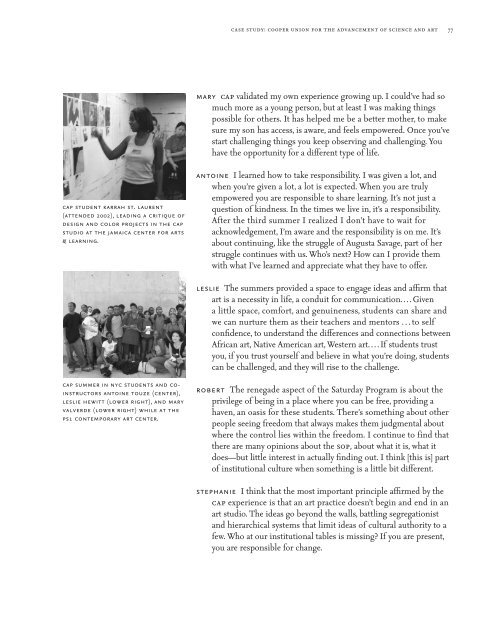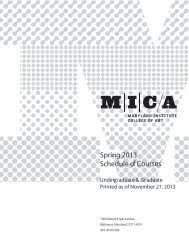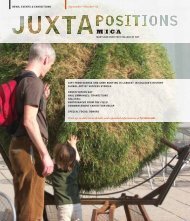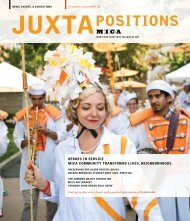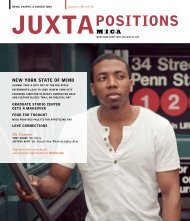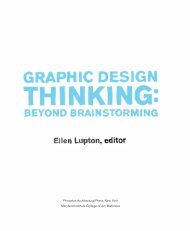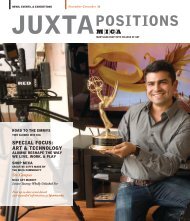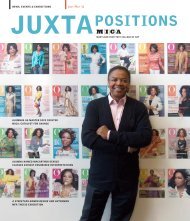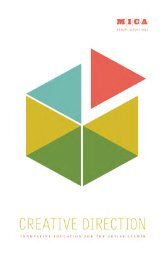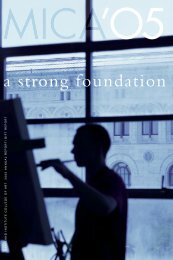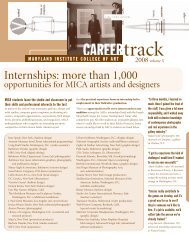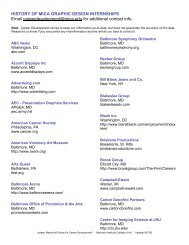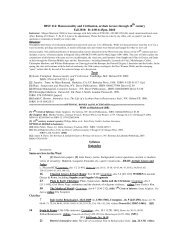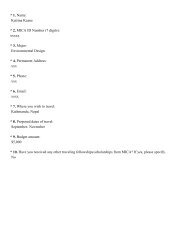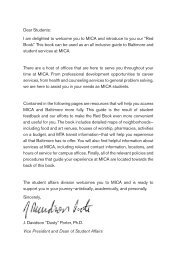art/vision/voice - Maryland Institute College of Art
art/vision/voice - Maryland Institute College of Art
art/vision/voice - Maryland Institute College of Art
Create successful ePaper yourself
Turn your PDF publications into a flip-book with our unique Google optimized e-Paper software.
cap student karrah st. laurent<br />
(attended 2002), leading a critique <strong>of</strong><br />
design and color projects in the cap<br />
studio at the jamaica center for <strong>art</strong>s<br />
& learning.<br />
cap summer in nyc students and coinstructors<br />
antoine touze (center),<br />
leslie hewitt (lower right), and mary<br />
valverde (lower right) while at the<br />
ps1 contemporary <strong>art</strong> center.<br />
case study: cooper union for the advancement <strong>of</strong> science and <strong>art</strong> 77<br />
mary cap validated my own experience growing up. I could’ve had so<br />
much more as a young person, but at least I was making things<br />
possible for others. It has helped me be a better mother, to make<br />
sure my son has access, is aware, and feels empowered. Once you’ve<br />
st<strong>art</strong> challenging things you keep observing and challenging. You<br />
have the opportunity for a different type <strong>of</strong> life.<br />
antoine I learned how to take responsibility. I was given a lot, and<br />
when you’re given a lot, a lot is expected. When you are truly<br />
empowered you are responsible to share learning. It’s not just a<br />
question <strong>of</strong> kindness. In the times we live in, it’s a responsibility.<br />
After the third summer I realized I don’t have to wait for<br />
acknowledgement, I’m aware and the responsibility is on me. It’s<br />
about continuing, like the struggle <strong>of</strong> Augusta Savage, p<strong>art</strong> <strong>of</strong> her<br />
struggle continues with us. Who’s next? How can I provide them<br />
with what I’ve learned and appreciate what they have to <strong>of</strong>fer.<br />
leslie The summers provided a space to engage ideas and affirm that<br />
<strong>art</strong> is a necessity in life, a conduit for communication. . . . Given<br />
a little space, comfort, and genuineness, students can share and<br />
we can nurture them as their teachers and mentors . . . to self<br />
confidence, to understand the differences and connections between<br />
African <strong>art</strong>, Native American <strong>art</strong>, Western <strong>art</strong>. . . . If students trust<br />
you, if you trust yourself and believe in what you’re doing, students<br />
can be challenged, and they will rise to the challenge.<br />
robert The renegade aspect <strong>of</strong> the Saturday Program is about the<br />
privilege <strong>of</strong> being in a place where you can be free, providing a<br />
haven, an oasis for these students. There’s something about other<br />
people seeing freedom that always makes them judgmental about<br />
where the control lies within the freedom. I continue to find that<br />
there are many opinions about the sop, about what it is, what it<br />
does—but little interest in actually finding out. I think [this is] p<strong>art</strong><br />
<strong>of</strong> institutional culture when something is a little bit different.<br />
stephanie I think that the most important principle affirmed by the<br />
cap experience is that an <strong>art</strong> practice doesn’t begin and end in an<br />
<strong>art</strong> studio. The ideas go beyond the walls, battling segregationist<br />
and hierarchical systems that limit ideas <strong>of</strong> cultural authority to a<br />
few. Who at our institutional tables is missing? If you are present,<br />
you are responsible for change.


